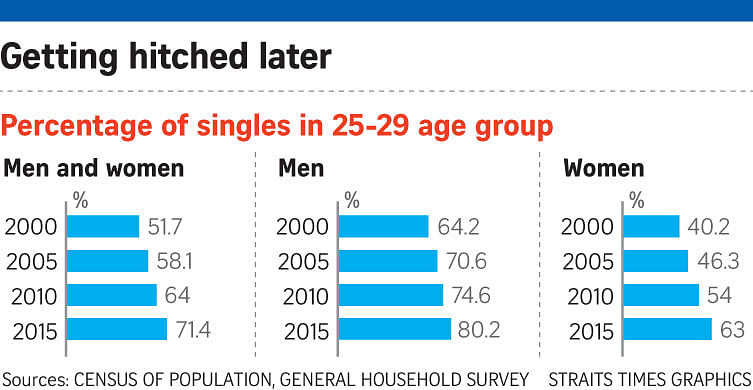More young people in Singapore staying single
Singles now make up 70% of those in 25-29 age group, which experts say has hurt fertility rates
Sign up now: Get ST's newsletters delivered to your inbox

Singles now make up 70 per cent of those in the 25-29 age group, which experts say has hurt fertility rates.
PHOTO: ST FILE
More Singapore residents in their mid to late 20s are staying single, with most putting their career before marriage, said experts.
They make up 70 per cent of the people in their age group last year, a sharp rise from 50 per cent about 15 years ago, the latest General Household Survey shows. Their decision to delay marriage has hurt the country's fertility rates, and more needs to be done to get them to find partners earlier in life, said sociologists interviewed yesterday.
"One reason we are concerned is that if a woman marries past the age of 25 to 29, it will not be as easy for her to conceive naturally or have a larger family," said National University of Singapore (NUS) sociologist Paulin Straughan.
The decision not to get hitched is as prevalent among men as women in the 25-29 age group, often viewed as mature enough to marry.
Proportionally, their numbers have been rising steadily in the last 15 years, government surveys and the population census show.

In 2000, bachelors formed 64.2 per cent of their cohort, rising to 70.6 per cent (2005), 74.6 per cent (2010) and 80.2 per cent (2015). The corresponding figures for women are 40.2 per cent (2000), 46.3 per cent (2005), 54 per cent (2010) and 63 per cent (2015). But as they grow older, many do get married.
The latest household survey shows the proportion of married people among the resident population of citizens and permanent residents has hardly changed in the last 15 years. Overall, it hovers around two-thirds of the population.
The main reason young people are not marrying earlier is because more are better educated and choose to focus on their careers, said Associate Professor Straughan and NUS sociologist Tan Ern Ser.
Said Prof Straughan: "The pressure to perform is very strong as the rewards of employment are immediate. There's a promotion at the end of the year and you get praised.
"But if you invest time to find a life partner, nobody's going to praise you."
Having enough money to set up home and start a family is also a concern for some like legal counsel Lionel Liu, 29, who plans to get married to his girlfriend in a few years.
He noted that his parents had been working for around six years by the time they got married at 24.
But he and his men friends were 25 when they graduated. "We have to spend the first three years of our working life paying off university loans, and only after that can we think about what's next."
Others may prefer to enjoy the freedom of singlehood before taking the plunge into married life, said Associate Professor Tan.
Mr Robin Neo, 28, a fresh graduate in mechanical engineering, said: "Readiness for marriage cannot be rushed. I'm okay with marrying in my twilight years since I'm not planning to have children."
But for those who want children, the biological clock is ticking.
The survey shows the average number of children born to resident women who have married at least once, dipped from 2.24 in 2010 to 2.14 last year. They include widows and divorcees.
Prof Straughan suggested targeting efforts to encourage earlier marriage at those who are not dating. But finding a significant other can be awkward in Singapore, she added. "There's no culture here where you can walk into a bar and say, 'Hi singles, I'm here'."
To overcome the obstacle, she said bosses need to encourage their employees not to work late, by say, turning off the air-conditioning at 7pm.Universities can do their part too, by providing venues and funds for students to hold social activities.
• Additional reporting by Rachel Chia
Correction note: An earlier version of this article said bachelors in the 25-29 age group formed 81.2 per cent of their cohort in 2015. We are sorry for the error.


